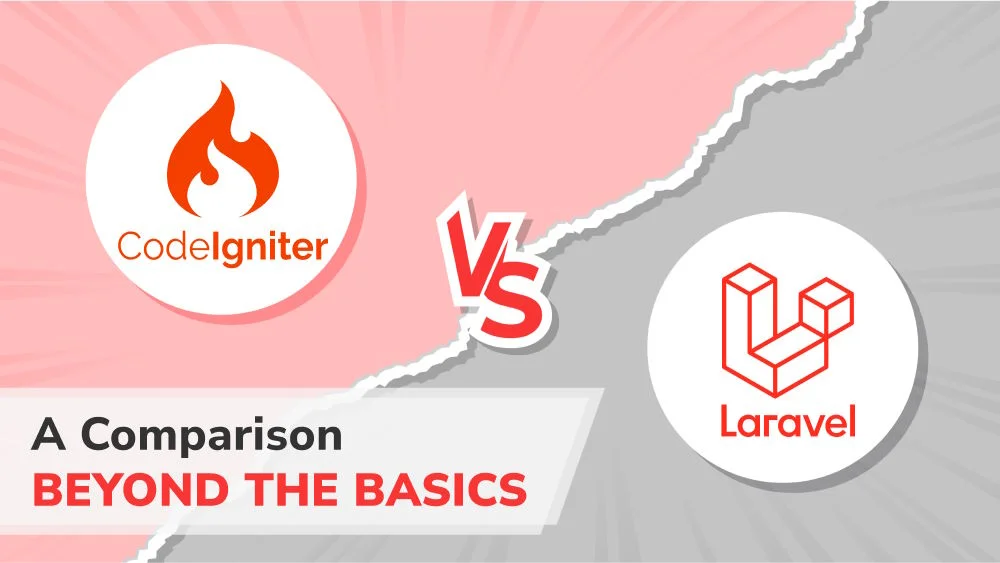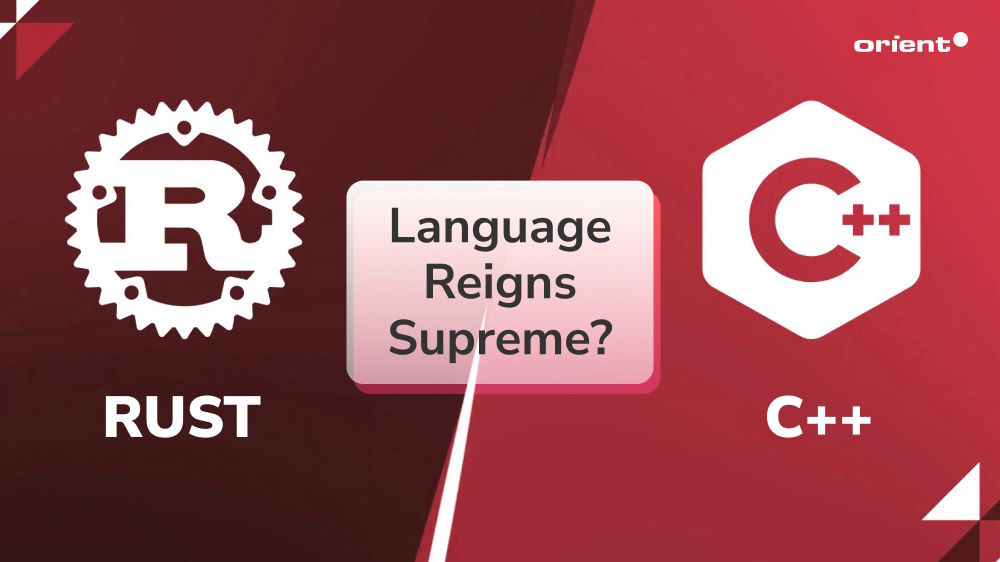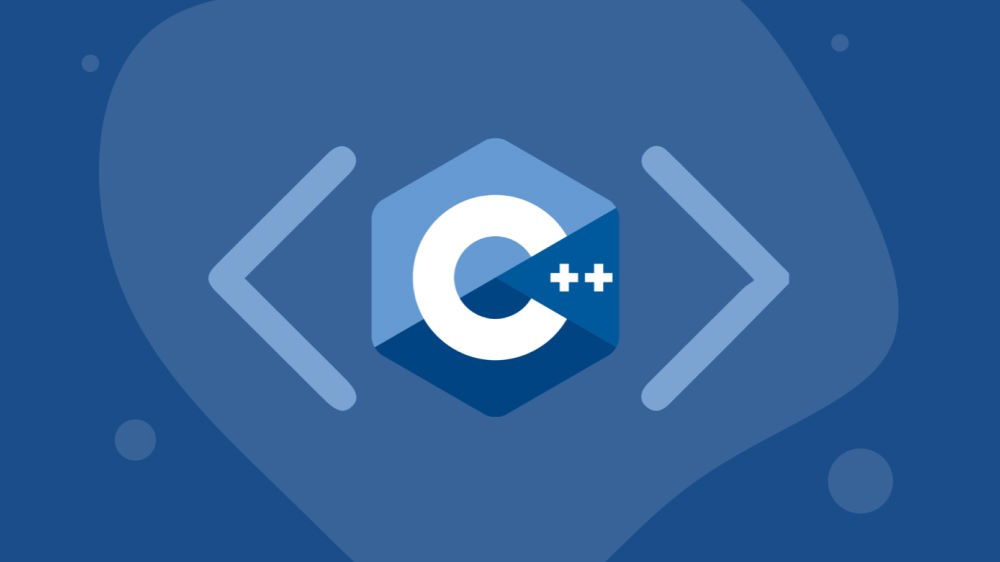
Rust vs. C++: Which Language Reigns Supreme?

Content Map
More chaptersChoosing a programming language isn’t simply about considering popular options. It is the process of learning about the specific characteristics of each language and how well it will work with your software project. To find the best fit, development teams typically compare similar languages.
As languages for systems programming like operating systems or game engines, companies often take Rust and C++ into consideration due to their similarities in performance and low-level capabilities. There is no doubt that C++ is a language that has a more extended history and a larger community, but it’s not necessarily the best language for every project. Meanwhile, Rust is a new language in the programming world, and many developers hesitate to adopt it.
Rust vs. C++. Which to choose is indeed a difficult question. Luckily, you’ve come to the right place. While we would like to offer you the most optimal programming language for your project, it heavily relies on your project’s specific requirements. However, we can still provide you with a professional perspective to help you make an informed decision.
What to Know about Rust

Don’t think Rust is a new language and underestimate it. Being placed on the scale with an aging language like C++ proves Rust’s great potential. In the top 20 most popular programming languages, Rust is in the 11th position with increasing popularity. Let’s discover this language, starting with the necessary information below.
Introduction to Rust Programming
Rust is a relatively new language first released in 2010 by Mozilla. As a multi-paradigm, general-purpose, and low-level programming language that prioritizes performance, memory safety, and concurrency, Rust is a reliable choice for developing software of all kinds. With the ability to compile to WebAssembly, this language is especially suitable for web-based applications that demand high performance.
Rust was born with the purpose of creating a better tool for Rust programmers to address sensitive perceptions in other programming systems languages, including C and C++. Although C++ and Rust are syntactically similar, the vast majority of developers prefer Rust due to this language’s increased speed, security, reliability, and purported ease of programming.
Key Features of Rust
- Zero Cost Abstraction: Rust makes it easy for systems programmers to write high-level code without incurring a runtime performance penalty.
- Error Messages: This feature supports the development team in debugging and improving the development process.
- Type Inference: Rust allows the compiler to determine types when they’re not explicitly specified by the developer with the help of type inference.
- Memory Safety: With strict ownership, borrowing, and lifetime rules, Rust minimizes cases related to memory leaks and eliminates security issues.
- Concurrency Support: Rust emphasizes concurrency, enabling developers to write safe, concurrent code without data races.
- Pattern Matching: The language supports pattern matching, a powerful feature for working with complex data structures.
Why Developers Use Rust Code
Many people believe that Rust is one of the best C++ alternatives as it is even much safer and more efficient than its predecessor. To understand why developers use Rust instead of other languages, you need to examine its benefits closely.
Memory Safety Guarantee
Rust’s reputation for strong memory safety has positioned this language as an ideal choice for systems programming, where precise memory management is a critical concern. Rust achieves this through a combination of many design principles and innovative features, including an ownership model, borrowing, and rigorous compiler checks.
The ownership model allows Rust programs to manage memory usage at compile time without relying on a garbage collector. Meanwhile, Rust’s borrow checker allows safe temporary access to resources, which helps developers prevent use-after-free and double-free bug troubles, and rigorous compiler checks help detect and prevent memory-related issues during compile time. By providing strict control over memory ownership, Rust minimizes the risk of memory leaks, which often appear in other programming languages like C and C++.
High Performance
Rust’s efficiency in utilizing system resources and ability to facilitate direct hardware interactions are key contributors to its high-performance-oriented nature. With the ownership model and borrowing systems that enable thread safety without the need for a garbage collector, Rust makes application performance faster and more predictable.
Whether it is through optimized memory allocation or expedited processing of input/output operations, the language is designed to excel in performance-critical scenarios. Rust is an attractive choice for developers seeking to harness the power of applications such as real-time processing, high-performance computing, and embedded devices.
Efficient Error Handling
Rust has a robust error-handling mechanism with the help of Result and Option types, making the creation of code more reliable and predictable than ever. In case errors appear during development, Rust provides the tools to respond effectively to error conditions. While Result types allow functions to return either a success value or an error, Option types encapsulate the absence or presence of a value. The combination of these two mechanisms helps developers reduce the likelihood of overlooked error scenarios, further leading to more resilient and maintainable codebases.
Growing Community Support
Although a relatively new language, Rust has a vibrant community of users who actively promote knowledge sharing, tool development, and the establishment of best practices for the overall development of the ecosystem. This community not only includes experts in software written in Rust but also a platform with a solid commitment to supporting newcomers in learning the language’s syntax and principles. Besides initiatives such as RustBridge, Rust also expands the space for exchange and learning through the development of the Rust Programming Language Community Server on Discord.
By championing knowledge sharing, inclusivity, and supportive interactions, the Rust community continues to serve as a valuable resource for developers seeking to engage with the language and its ecosystem.
What to Know about C++

C++ is a well-known programming language used by many developers to build modern and secure applications. After many years of formation and development, this language continues to bring many new improvements to users. What is the real reason behind the rising popularity of C++? Discover the answer through the information below.
Introduction to C++ Language
C++ is a high-level, general-purpose programming language developed in 1985 by Danish computer scientist Bjarne Stroustrup. As an extension of the C language, C++ is a more improved version, overcoming existing shortcomings in C. With its extensive features, reusable code modules, and determined data structure, C++ is suitable for a variety of applications and programming styles and is commonly used in system software, game development, and performance-critical applications.
Among the diverse applications of C++, game development is particularly noteworthy. It is C++’s ability to handle resource-intensive tasks and provide low-level memory manipulation capabilities that have helped this language become one of the most popular choices today in stunning 3D visuals and video games.
Key Features of C++
- Object-oriented Programming: By supporting object-oriented programming (OOP) principles, C++ allows for the creation and inheritance of objects, ultimately improving code organization and reusability.
- Machine Independence and Platform-dependence: Being both machine-independent and platform-dependent at the same time, C++ helps developers run code on different hardware architectures while utilizing specific platform features.
- Low-level Control: As a memory-safe language, C++ allows precise control over memory and system resources and is especially suitable for system-level programming and performance-critical applications.
- Case Sensitivity: C++ distinguishes between uppercase and lowercase letters, which can affect variable names and other identifiers.
- Structured Programming Support: C++ supports structured programming principles, aiding in the development of organized and maintainable code.
Why Developers Use C++ Code
Despite the emergence of newer programming languages, C++, over the years, has maintained its position in the software development landscape thanks to the undeniable benefits it brings to users of all professions.
Performance and Efficiency
C++ is famous for its high performance and efficiency based on several ingrained characteristics in its design. With low-level memory manipulation capabilities through pointers, C++ allows developers to finely control how data is stored and accessed, making this language a prime candidate for resource-intensive applications across diverse industries.
Besides low-level memory manipulation, C++ also proves its performance effectiveness in its support for inline functions and deterministic object destruction. While inline function expansion can reduce the overheads associated with function calls to enhance codebase efficiency, deterministic object destruction through destructors can promptly release no longer-needed system resources to utilize memory usage.
Its support for multi-paradigm programming is also an important aspect that makes C++ a top choice for tackling performance-critical domains such as autonomous driving systems, robotics, and high-performance computing.
Versatility and Flexibility
C++ is also favored by developers because of its high level of versatility and flexibility. In C++, users can use unsafe blocks to exert low-level control over system resources. By combining with low-level programming capabilities and allowing users the freedom to create tailored and efficient data structures and algorithms through functions and methods, C++ is suitable and easily adaptable to a wide spectrum of domains, from complex software solutions to real-time ones.
Legacy Code Compatibility
As a long-standing language, C++ is the foundation for many existing systems today in the tech market. For this reason, instead of choosing another language for the next project, many businesses continue to use C++ as a preferred language for maintaining and integrating with available software.
The backward compatibility of C++ versions ensures smooth transitions when working with older codebases, allowing for seamless integration with modern C++ environments. This adaptability is particularly valuable in scenarios where there is a need to update software systems using C++ organizations while preserving the functionality of legacy code.
Industry Dominance
C++ is the language behind the success of a series of projects in different fields. The language is heavily used in the automotive and robotics industries. It is also the backbone of the gaming sector, with most packaged software, such as video games or operating systems, still being written in C++.
Due to its robustness, reliability, and ability to control hardware resources, its continued relevance and widespread adoption show no signs of stopping at the present time. C++ proven success in powering critical systems has undoubtedly influenced future companies to embrace this language for their projects.
A Technical Comparison between Rust and C++ Systems Programming Language
| Aspect | Rust | C++ |
|---|---|---|
| Memory Safety | Better memory safety | Better in term of compile time and pointers |
| Syntax and Principles | Similar syntax to C++, safety-first | Extensible, complex and verbose |
| Frameworks and Libraries | Growing ecosystem | Extensive frameworks and libraries |
| Concurrency and Parallelism | Has built-in support for safe concurrency and parallelism | Requires careful manual management of shared memory |
| Learning Curve | Poses a steeper learning curve due to ownership model and strict compiler checks | Poses a steep learning curve due to a complex learning path |
| Execution Time and Performance | Comparable overall speed and performance | Advantages in polymorphism, templates, objects |
| Error Handling Philosophy | Emphasizes return values for error handling | Utilizes exceptions primarily for error handling |
| Use Cases | Suitable for applications emphasizing performance and safety | Versatile for applications emphasizing performance and efficiency |
Making the Decision: Is Rust Better than C++?
The Rust vs. C++ debate is a difficult-to-resolve one. You can search for keywords like “Rust vs. C++ performance” or “Rust vs. C++ speed” to understand more about their characteristics, strengths, and weaknesses. Unfortunately, the concept of better language does not exist. The choice of language depends strongly on factors such as the nature of the project, technical requirements, and technical expertise of the development team, etc. Each organization will have its own appropriate language.
You can even use both languages within a single software project to optimize the quality of outcomes. This approach, known as polyglot programming, enables developers to leverage the strengths of different languages to tackle different aspects of a project. For instance, game development is an area that often involves a combination of programming languages. You can use C++ to build performance-critical game engines while using scripting languages like Python to employ the gameplay logic. Regardless of which language you choose, the advice is to choose what you need.
At Orient Software, we don’t just provide services; we create service quality according to a customer-centric approach. By closely following all aspects of project implementation, providing expert advice, and directly engaging in the development process, we have made many Rust and C++ projects for customers from all fields successful. Feel free to contact us and get a free quote.






